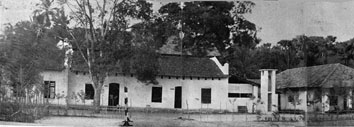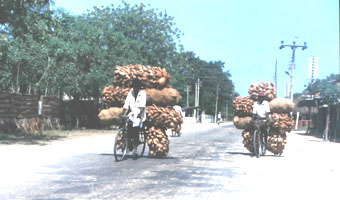"To us all towns are one, all men our kin. |
"To us all towns are one, all men our kin. |
| Home | Trans State Nation | Tamil Eelam | Beyond Tamil Nation | Comments |
Home
> Tamils - A Transtate Nation > Eelam > Journey Down Memory Lane - Chapter 1 > Chapter 2 > Chapter 3 > Chapter 4 > Chapter 5 > Chapter 6 > Chapter 7 > Chapter 8 > Chapter 9 > Chapter 10 > Chapter 11 > Chapter 12 > Chapter 13 > Chapter 14 > Chapter 15 > Chapter 16 > Chapter 17 > Chapter 18 > Chapter 19 > Chapter 20 > Chapter 21 > Chapter 22 > Chapter 23 > Chapter 24 > Chapter 25 > Chapter 26 > Chapter 27 > Chapter 28 > Chapter 29 > Chapter 30 > Chapter 31 > Chapter 32 > Chapter 33 > Chapter 34 > Chapter 35 > Chapter 36 > Chapter 37 > Chapter 38 > Chapter 39 > Chapter 40 > Chapter 41 > Chapter 42 > Chapter 43 > Chapter 44 > Chapter 45 > Chapter 46 > Chapter 47 > Chapter 48 > Chapter 49 > Chapter 50Journey Down Memory Lane To Reach 'tamiz Izam'
R.Shanmugalingam
Chapter 2
Historians are the creation of historians, but long before history, traditions and events survived in the form of grandmother tales.
Very early in my life, we were always on the move among, Kopay my father's birth place, Chankanai my mother's birth place, and Manipay, my father's work place- he was a teacher at Manipay Hindu College for over twenty-five years. He had to resign as loyalty to his Principal the late Mr. V. Veerasingam JP. M.B.E., - the British Monarch's Birthday honor reward for their kind of loyalty - clashed with father's loyalty to 'tamiz' by supporting Amirthalingam in the 1951 general election.
for over twenty-five years. He had to resign as loyalty to his Principal the late Mr. V. Veerasingam JP. M.B.E., - the British Monarch's Birthday honor reward for their kind of loyalty - clashed with father's loyalty to 'tamiz' by supporting Amirthalingam in the 1951 general election.
Although my father was a strong supporter of G.G.P., he moved away from Tamil Congress along with 'taNty' Chelva. Reason for this break away needs elaboration and it will have to wait. We were living in Chankanai when my paternal grand mother died, the family moved to Kopay. It was mid school year and my elder brother 'The Prince of Wales" and I the second in line to the Ramalingam dynasty then, had to commute from Kopay to Chankanai. Monday morning Minayar, that is how I remember the bus driver's name, will stop the bus on the Kopay, Point Pedro road in front of CMS, as our house was down the lane behind the new Kopay Police station, comes home and carries us to the bus. I do not know how many buses were there in Jaffna, but this was a six-wheeler and that sticks in my memory.
At the Jaffna bus stand we sometimes change bus or the same bus will take us to Chankanai to my maternal grand mother's place. Sometimes we were left in the custody of my maternal uncle's brother in law who owned the "Anyp pajilvAn cidukkuruvic cattin lEkijam' store in front of the bus stand at the corner, between bus transfers. I used to love this short transfer arrangement because that store was famous for a fruit, chocolate, biscuit, etc. and known as the 'pazak kady.' In those days apples were imported from Australia, UK, oranges from Jaffa, Australia, and chocolates and biscuits mostly from England. They were the real stuff.
During such visits, grand mother used to tell bed time stories. One story was about the time when Araly sea-the deaf one, and Keerimalai sea-the blind one or vice versa, decided to meet. There was a big roar and when both of them met midway, the waves were mountain high and very few people survived the disaster. Later years, whenever I thought of the meeting of the deaf and blind, it reminded me of the story of Noah's ark. I believed for a long time that our people lived through that disaster and still wonder!
When father left Manipay Hindu and joined Padaththeruppu Hindu College, one of the few English Schools under the Hindu Board of Management, which to its credit under the able stewardship of the late Hindu Board Rajaratnam managed over two Hundred Tamil Schools and a handful of English Schools.
My father succeeded the late Singhi master at Pandaththeruppu Hindu that was a one hall school partitioned to accommodate classes up to S.S.C. and an office block. Later, my father with the help of financial aid from Malaysia and through various funds developing techniques such as school drama, variety shows, raised money to add another wing including a modest science lab. For the most part of my father's school expansion project, I was away and was not aware of the domestic squabbles mostly over the salary, which I came to know later went into emergency bill payment in connection with the school expansion program.
Chankanai is a commercial center, commanding an area reaching up to Kayts and some of the islands. Chankanai market, probably second to only the Chunnakam market had the unique distinction of trading with overseas customers. In the fifties, Chankanai was leading in cottage industries and priority was given for rural electrification. According to Swamy Appadurai author, poet and social worker from Chankanai and presently a Canadian told me that in his research for his book on Chankanai, he found out that my father was the first resident with a BA. Degree.
Chankanai gave us the edge over many other Jaffna villages and towns, as no one starved there. Even the most lazy could go empty-handed to the market and come back with enough goods for the day's family kitchen needs. 
Talking of magicians, there were many a show where the magician sawed his child's head and changed it to face backward, and the snake oil trader who could bend an 'Ikkil' without breaking, and the acrobat who could ride a 6 or 8 ft. pole as if a pony and the Indian rope trick that makes a rope dance like a snake and the numerous snake charmers, monkey, acrobats, and peddlers of all kinds including knife sharpeners, lead coaters to copper and brass ware. I am certain that if we adopt the current American standard to lead poisoning, some of us should not be alive!
It was living with no refrigerator, as there was no need to preserve anything as it was a few minutes walk to the market to get everything fresh, including, fish, mutton-goat meat, turtle meat, chicken. 'kUz' was a delicacy in some homes, a staple food in others. 'kUz' as a delicacy is a luxury. Although my father was a vegetarian from birth to death, we were influenced by mother and I am glad there was no male chauvinism, many like to associate with our culture. If my mother did not have any say in bringing us up, probably, we would have missed the delicious taste of meat, prohibited to Hindus, and ended up as Hindu Tele-Elevangelists!
One of the best combinations for a relaxed week end is a few glasses of fresh palmyrah toddy in the morning and a 'kUz' lunch. When I say lunch, it is a complete 'kUz' lunch with side dishes such as fried prawns, fish, cuttle fish (squid). I have had 'kUz' parties wherever possible, even here in the US, and I tell you it is expensive and only an apology for that toddy laced 'jAzppAnham kUz.'
The months of March to July are hot and this is also the season for female palmyrah to flower. The tappers climb these trees twice a day and slice the flower razor thin and tie a pot as to hang down. Like any syrup collection, the juice and in this case toddy drips into the pot and collected when it is replaced with an empty one in some cases twice a day. The long palmyrah inflorescence is long enough to stand daily shaving for fresh drip, for 4 to 5 months. One tree may carry as many as 15 inflorescence and there was a particular tree in our 'panaNtOddam' and the caretaker of the land who was also the tapper, named it shorty-'kaddycci' that used to give over 30 bottles of toddy at each harvest.
Palmyrah toddy is used as a coolant during sickness such as mumps, measles, chicken pox etc. My brother was a fuss box. He needs a few chapters but I will narrate only that part where I save him from forced toddy drinking at times of those feared diseases, feared because, our people believed that these were a scourge sent by an angry Amman deity. During such times every one in the locality eats only vegetarian food, and the patient is quarantined for two to three weeks depending on the severity of the attack.
At the end of the quarantine period, they are taken to the nearest Amman temple, very early before others wake up, given a bath at the temple well. I used to wonder how the whole village does not get infected at least those who use the temple well and my father explained, unlike other cultures, we do not end the quarantine before the marks completely disappear and the scales have dropped off and ended the incubation period during quarantine, and only when the skin is virtually new, we are bathed and declared safe to mix in society. Another ritual associated with this scourge is avoiding meat and fishes in the vicinity. That perhaps helps the organisms to die without a suitable host to parasite on.
My brother who hated toddy, will give me his share of the toddy and with a double shot of the anaesthetizing stuff I am dead to itching and pain and boredom, whereas my brother is wide awake suffering the wrath of the goddess Amman, gently soothed and pampered by my parents and grandmother, which care and attention he needs even today. So I will talk about my family in the next episode.